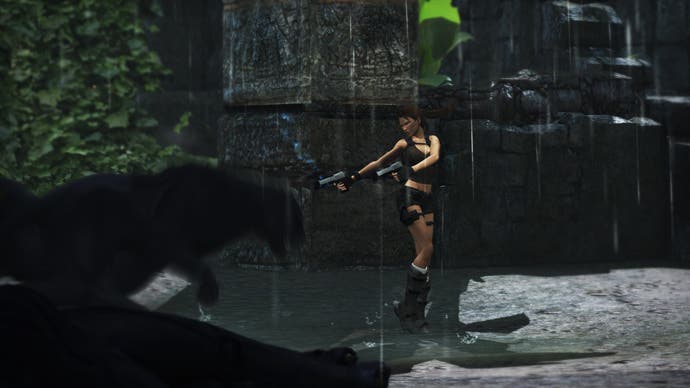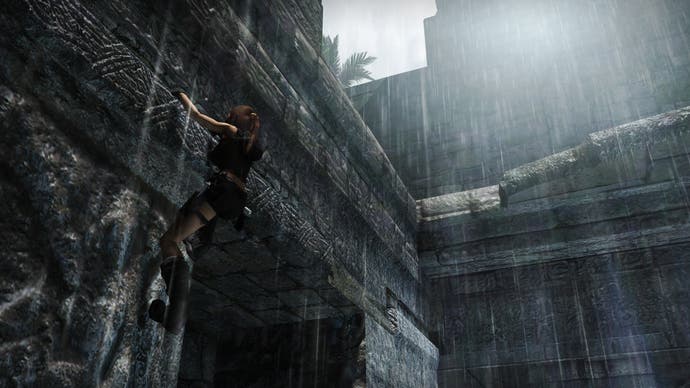Tomb Raider: Underworld
Deep.
On the move
But the best thing about what we're seeing on screen is the fact it looks like a Tomb Raider game should. Ancient temples, lush jungles, Lara alone and with a great expanse of environment to explore. And she hasn't even started moving yet.
But as two panthers burst out of the undergrowth Lara leaps into action and the first of her new combat moves is revealed. She can dual-target, shooting one panther with the pistol in her left hand while simultaneously taking out the other with her right. She can also perform new moves while shooting, such as a swan dive.
Objects in the environment can be used in combat now. To demonstrate this, Lara finds a large pole and whacks the panthers with it to finish them off. In previous Tomb Raider games you'd expect their bodies to disappear, but they don't. Underworld's environments are persistent so if you kill something or move an object it will remain as you left it for the entirety of the level. You could say it's about time, but still.
Time to show off Lara's new acrobatic moves. "Each one creates new exploration and combat scenarios," says Van Rompaey. "Every move has been expertly animated using motion-capture of an Olympic-trained gymnast, and the results are some of the best ever seen in a videogame."

Lara can not only balance on beams but vault and backflip along them. She can rappel down vertical surfaces, perform wall kicks and melee kicks. She can shoot while clinging from ledges and hanging onto ropes. She's got a new sprint move, which allows her to run so fast it's almost funny. All of these moves are performed with spectacular grace and fluidity, making you wonder why that gymnast was only Olympic-trained and not a medal winner.
No fear
The most exciting-sounding new feature is the ability to "free-climb". Without being able to try this out first-hand, however, it's hard to gauge how it works. You can see Lara's no longer constricted to pulling herself along ledges; she uses her arms and feet to traverse a section of wall like a rock climber would.
But it looks like she's constrained to using the lumps on the wall which stick out and look brighter than the rest of it. This doesn't seem like free-climbing, more like following a set path but with a new animation. We're also told Lara can now move around concave and convex surfaces, but this isn't being shown in the demo.
Lara can now use objects in the environment to create new paths. "This is very exciting for us. It's not used in any other game," says Van Rompaey. "It really does change the way you think and play Tomb Raider." Lara grabs the pole again and slots it into a hole in the wall, turning it into a pole she can swing and jump from. We're told Lara can also destroy or manipulate objects in new ways to establish routes, for example burning trees to clear a pathway.

The grapple hook is back, but Eidos has listened to criticisms the catch points in Legend were "too bling". Now they blend quietly into the environment and it's up to you to spot them. The grapple won't detach if a solid object comes between Lara and the catch point. This means she can exert force on the grapple line and use it to, as is being shown here, pull a large stone block off a pillar. The blocks in Underworld are physics items, so they won't fall into the same position each time.
The falling block smashes open a pair of stone doors and Lara retrieves the relic she's after. It's only one in a series of objects she's had to obtain in this environment. "The levels are of a scale we haven't seen before," explains Beacham, adding that you have the freedom to decide what order you solve puzzles in.
According to Van Rompaey, "Underworld features large-scale mechanisms and challenges which span entire environments rather than just being restricted to a particular locale in order to open the next door. Each environment is a formidable adversary that the player will have to overcome."
